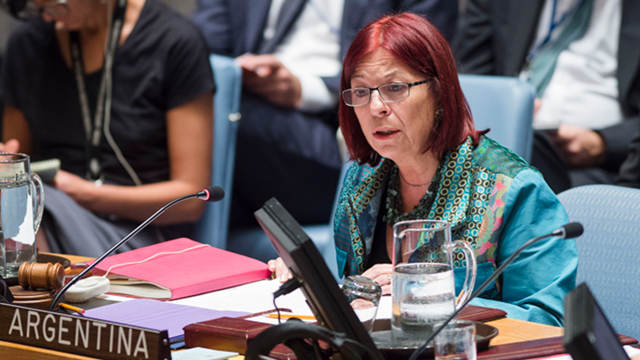SUMMARY
This is AI generated summarization, which may have errors. For context, always refer to the full article.

UNITED NATIONS – A month after withdrawing from the Syrian to the Israeli side of the Golan Heights, will United Nations peacekeepers return to ensure they effectively carry out their mission?
The UN Security Council discussed the possibility but said a return will depend on the situation on the ground after Syrian rebels took over the positions of the UN blue helmets. The withdrawal hastened the pullout of Filipino peacekeepers in September.
Argentina’s Ambassador to the UN Maria Cristina Perceval said the UN is planning the return of the peacekeepers to the Syrian side but she did not give a timeline or a definite proposal. Still, she said that the situation in the Golan is “getting better” because dialogue with Syria and Israel continue.
Perceval spoke with reporters after the Council held closed-door consultations on Monday, October 20, at the UN Headquarters in New York on the mission known as the UN Disengagement Observer Force (UNDOF).
“They have the plan. [It] depends on the circumstances but obviously, the commitment is to return the first installation of the UNDOF,” said Perceval, whose country holds the rotating presidency of the Council for this month.
UN Assistant Secretary-General for Peacekeeping Operations Edmond Mulet briefed the Council on the situation in the Golan Heights.
The briefing aimed to update the Council 30 days after UNDOF withdrew to the Israeli side. Analysts have said that the pullout effectively made the peacekeepers’ mission to observe the buffer zone between Israel and Syria defunct.
The Council created UNDOF in 1974 to maintain the ceasefire between Israel and Syria, and monitor the so-called area of separation in the strategic Golan plateau after their 1973 war. The spillover from the Syrian civil war made the mission increasingly difficult and dangerous.
Perceval said that the briefing did not touch on the investigation that the Philippines requested on the disputed order of UNDOF commander Lieutenant General Iqbal Singh Singha for the Filipino and Fijian troops to surrender their weapons to the Al-Qaeda-linked Al Nusra Front.
President Benigno Aquino III has said that the results of the investigation will be the basis of his decision on whether or not to redeploy troops to the Golan. Aquino pulled out 344 peacekeepers due to the deteriorating situation there.
Mulet earlier wrote Aquino that “there is no expectation” that UNDOF will be able to deploy troops back to the Syrian side.
“This has rendered 245 or so personnel of the Philippines’ contingent non-operational,” Mulet said in a letter to the Philippine government.
Among the top troop contributing countries in Southeast Asia, the Philippines in August decided to pull out its peacekeepers after two kidnapping incidents last year.
Incidentally, the withdrawal happened right after the controversy surrounding the Filipinos’ decision to defy Singha and escape after coming under Syrian rebel fire in late August.
The Philippines followed Croatia, Austria and Japan in pulling out of the Golan. Only Fiji, India, Ireland, Nepal and the Netherlands remain.
‘Hard to recover UN vehicles, equipment’
Speaking on behalf of her country, Perceval said that the Council discussed efforts to recover the weapons, equipment and vehicles that Al Nusra took from the Fijian peacekeepers, whom the rebels held hostage for two weeks.
“Obviously, not only the UN but the countries continue to try to find that it’s very difficult because they (rebels) change the characteristics of the vehicles,” she said.
The ambassador said that the issue will have to be included when the Council meets again in December to renew UNDOF’s mandate. The mandate is up for renewal every 6 months.
Perceval said that the briefing also did not touch on reports that the UN paid a $25 million ransom to secure the release of the Fijians.
Despite the siege, kidnapping and withdrawal of peacekeepers, the Council president said that Syria, Israel and all 15-member states agreed on the relevance of UNDOF’s mission.
“All the [Council] members reaffirm that it is not necessary to change the commitments that this mandate has, with the elements that enforce, make more strong the possibility to accompany this mandate,” Perceval said.
The view echoed the report of Singha to the Council on October 10 that UNDOF is still able to carry out its mandate.
Aquino though publicly criticized the mission, saying the lack of equipment coupled with the presence of the Syrian rebels made it “impossible or unclear.”
No decision on use of technology
Also on the agenda of the briefing was the possible use of new technology like unmanned, unarmed aerial vehicles or satellite imagery to help peacekeepers in their monitoring task.
Perceval said there is no agreement yet on technology use.
“This is in conversation with the two parties (Israel and Syria). In different moments, we reiterate especially in this delicate situation that the two parties have to agree. Also, [on] what technology is going to be used.”
The independent organization Security Council Report earlier noted that initial discussions show that Israel and Syria are reluctant to authorize the use of the new technology.
The Report also explained why the Council wants to maintain UNDOF’s mandate despite the setbacks and volatile situation.
“Its utility is particularly high now to avoid further negative security implications for the region. In this regard, most Council members are keen to maintain good relationships with troop-contributing countries to ensure UNDOF’s ability to operate effectively.” – Rappler.com
Rappler multimedia reporter Ayee Macaraig is a 2014 fellow of the Dag Hammarskjöld Fund for Journalists. She is in New York to cover the UN General Assembly, foreign policy, diplomacy, and world events.
Add a comment
How does this make you feel?
There are no comments yet. Add your comment to start the conversation.